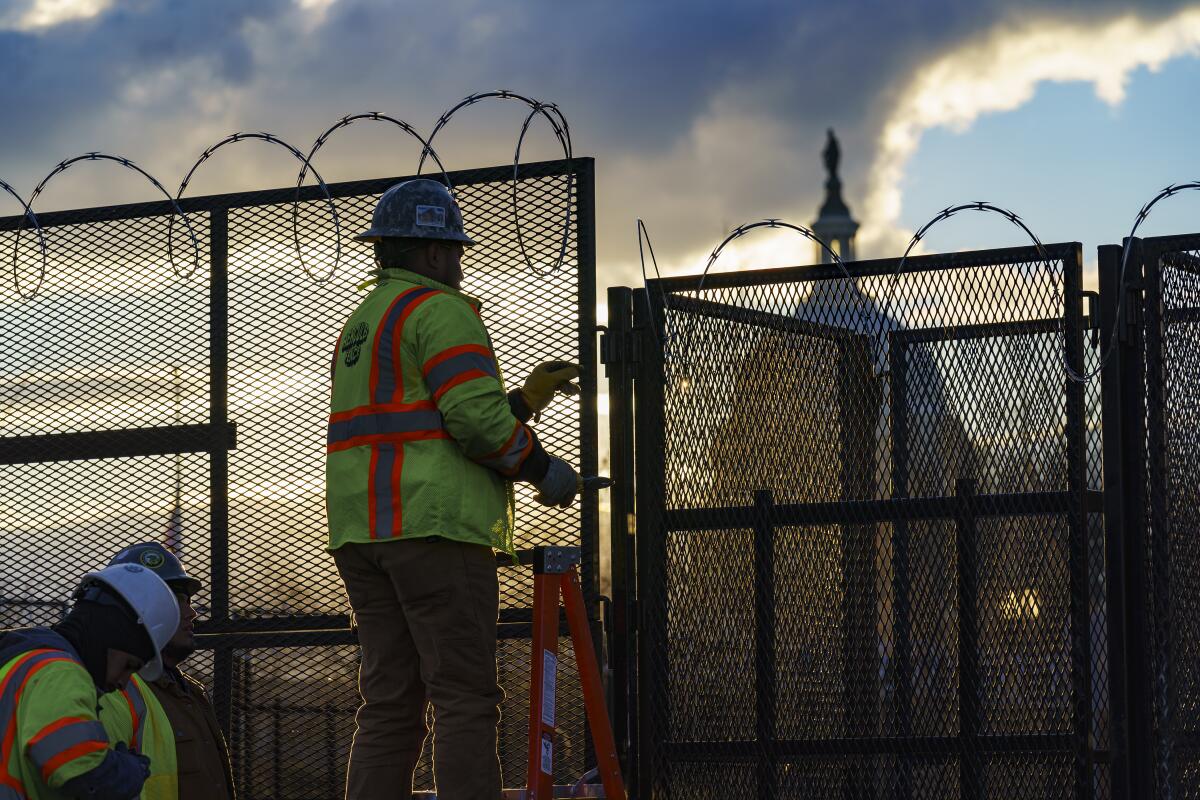How long will Washington have to be an armed camp?

- Share via
In preparation for the inauguration of President-elect Joe Biden and Vice President-elect Kamala Harris, the nation’s capital has been transformed from a tourist destination into Fortress D.C.
Some 25,000 National Guard troops are on the streets, the U.S. Capitol is surrounded by high fencing topped with coils of razor wire, the grassy sweep of the National Mall and its monuments are closed to the public, and several major bridges that cross the Potomac River from Virginia into Washington are shut down. It’s as if the District of Columbia pulled up the drawbridge to shutter itself tight against invaders.
Of course, there was no choice but to fortify the city after the Jan. 6 attack on the Capitol. The pandemic and the numerous threats of violence from extremists have put the district on lockdown and turned the cherished rituals and revels of inauguration into a tense and stripped-down constitutional exercise. There will be no jumble of happy visitors, giddy over the incoming administration and good-natured about crowded Metro stops and limo-choked streets. With COVID-19 in the air, there was never going to be an Obama-sized inaugural crowd of nearly 2 million; there was never going to be a crowd at all.
It’s not just Washington. State capitols have taken extraordinary security measures after the FBI warned of potential attacks by “domestic violent extremists” on state and federal buildings. In Sacramento, the Capitol building has been surrounded by 6-foot fencing. Camouflage Humvees and trucks patrol the area. Gov. Gavin Newsom called up 1,000 National Guard troops to support the California Highway Patrol and local police in providing security. Nearby, businesses and offices boarded up their windows. The Postal Service removed mailboxes.
Every inauguration, even those under less bleak circumstances than this one, is marked by heightened security. And Washington has long been a blended landscape of heavily guarded government buildings and residential neighborhoods. Security ebbs and flows depending on the crisis, although the barriers have gradually accreted over time. It’s part of life in the district to see law enforcement officers, barricades here and there and motorcades roaring by.
What’s extraordinary is to have the city turn into an armed camp. It’s frightening and depressing to contemplate heavy security becoming a way of life indefinitely, keeping at arm’s length everything that makes the city a piece of history you can visit up close.
The Mall, which extends from the Lincoln Memorial to the grounds of the U.S. Capitol, is closed through Thursday due to “credible threats to visitors and park resources,” according to the alert on the National Park Service website — an unprecedented precaution. Tours at the Washington Monument are suspended through Sunday. There’s an ominous warning that the closures may be extended “if conditions persist.”
No one expects bridges or Metro stops to stay closed for long. How would people get to work? And no one expects tens of thousands of National Guard troops to occupy Washington for the foreseeable future, although no one has said when, exactly, they will leave.
How much more security will the city have to live with? Much more, and “in places where people used to be able to enter more easily,” said Brookings Institution senior fellow John Hudak. “We are in a place where more is better until we understand what less looks like.”
How awful to think you couldn’t just walk up to a memorial and gaze upon it without making a reservation and going through a background check. The amazing thing about Washington is not just its history but the accessibility of it.
Lawmakers may have no one to blame but themselves for this sad state of affairs.
“We have members of Congress who campaigned on television with rifles, openly threatening sitting members of Congress,” said William Resh, an associate professor at the USC Sol Price School of Public Policy. If they can operate without accountability, Resh asked, “why should their base feel any differently?”
Law enforcement agencies hunting down insurrectionists would, of course, help make Washington safer. But so would Republican lawmakers around the country standing up for the integrity of our elections instead of pandering to the dangerous fantasies of extremists and conspiracy theorists.
Meanwhile, officials have to work to keep the district as open and available as possible under volatile circumstances. Even if landmarks have to reopen with increased security, it’ll be better than leaving tourists to peek through fences topped with razor wire.
More to Read
A cure for the common opinion
Get thought-provoking perspectives with our weekly newsletter.
You may occasionally receive promotional content from the Los Angeles Times.









